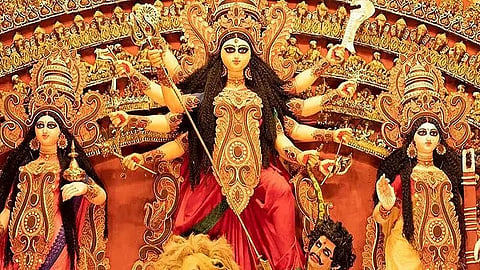
- Home
- Live Blog
- Breaking News
- Top Headlines
- Cities
- NE News
- Sentinel Media
- Sports
- Education
- Jobs

Guwahati: Maha Navami marks the victory of good over evil, the culmination of devotion, and the blessings of the goddess for strength, wisdom, and prosperity. It is also observed as Ram Navami in North India. Shardiya Navratri, celebrated in the lunar month of Ashwin (September–October), is one of the most important Hindu festivals, lasting nine days, each dedicated to a form of Goddess Durga. The Navami Tithi of Shukla Paksha, known as Maha Navami, is considered one of the most powerful days of Navratri, preceding Vijayadashami (Dussehra).
On this day, Goddess Durga is worshipped in her supreme form as Maa Siddhidatri, the bestower of wisdom, success, and spiritual powers (siddhis). According to scriptures, Maa Siddhidatri sits on a lotus, carrying a mace, discus, lotus, and conch, blessing devotees with both material and spiritual fulfillment. The day represents the culmination of Shakti worship and the union of devotion with divine energy.
An important ritual associated with Navami is Kanya Puja or Kanjak Puja, where nine young girls, symbolising the nine forms of Durga, are invited into homes, worshipped, their feet washed, and offered prasad consisting of puri, kala chana, and halwa. Sometimes a young boy representing Bhairav is also included. This practice emphasises respect for feminine divinity and the belief that the goddess herself manifests in these young girls.
For Bengalis, Durga Puja is the most special and auspicious festival. While devotees across India observe fasts during Navratri, Bengali households celebrate with grand feasts, music, cultural performances, and family gatherings, making it a time of joy and community.
This year, in Assam, the festive mood was tinged with sorrow due to the sudden demise of beloved singer Zubeen Garg. Different themed pandals paid tribute to him, while religious rituals and prayers went on across the state. On this day, hope also shone through for justice in Zubeen Garg’s death, as cultural entrepreneur Shyamkanu Mahanta and manager Siddharth Sharma were arrested from Delhi and brought to Guwahati by the CID, now in custody for 14 days. The occasion combined devotion, cultural reverence, and collective prayers for peace, righteousness, and justice.